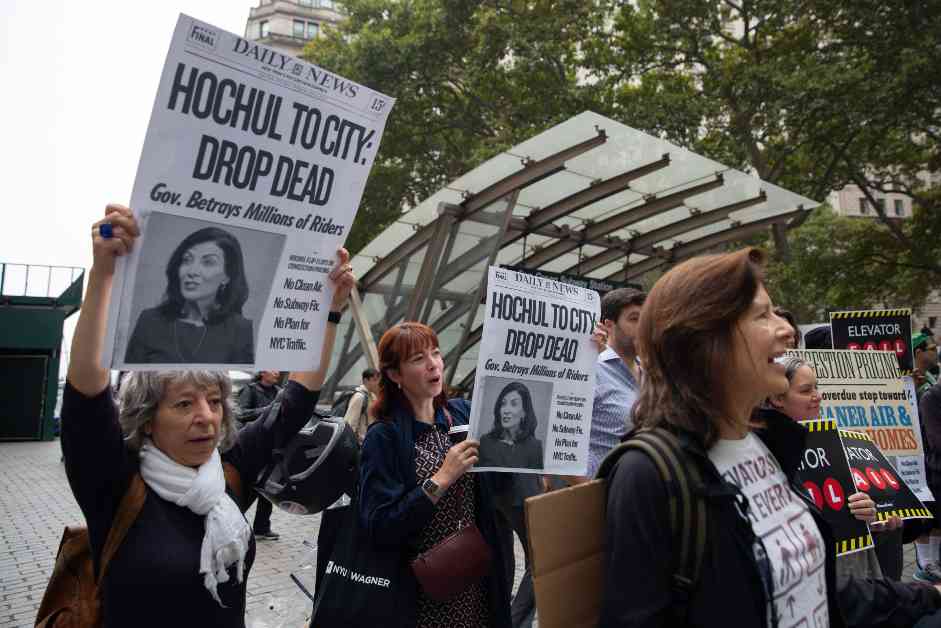MTA Board Approves $68.4 Billion Plan Amid Funding Uncertainty
The Metropolitan Transportation Authority (MTA) board recently gave the green light to a $68.4 billion blueprint for significant upgrades in the transit agency’s new five-year capital program. This decision comes amidst ongoing concerns about billions of dollars in funding that remain unaccounted for in the current plan and the next one.
The MTA board had a deadline of October 1 to submit the 2025-2029 plan for system upkeep and expansion to the state’s Capital Program Review Board, which now has 30 days to review and approve it. Despite facing a funding gap of $16.5 billion due to Governor Kathy Hochul’s congestion pricing pause in June, the MTA board members unanimously approved the plan.
Lisa Daglian, the executive director of the Permanent Citizens Advisory Committee to the MTA, described the plan as the costliest yet, with the biggest funding question mark. Hochul’s decision to halt congestion pricing has forced the MTA to scale back certain projects, such as subway signal replacements and the purchase of electric buses.
Challenges and Criticisms
The indefinite delay in congestion pricing has led to concerns about the financial sustainability of the MTA’s capital plans. Advocates for increased accessibility, such as the Elevator Action Group, have criticized Governor Hochul for not providing concrete solutions to address the funding gap.
Jennifer Van Dyck, a member of the Elevator Action Group, expressed frustration during a public meeting, stating that Hochul had created the problem and now needed to find a way to fix it. Despite Hochul’s promises to develop a comprehensive funding approach for the MTA’s capital plans, the absence of congestion pricing has left a significant hole in the transit agency’s budget.
Rachael Fauss, a senior policy advisor for Reinvent Albany, emphasized the importance of congestion pricing in the funding equation for the MTA. Without this revenue source, the MTA faces a projected $33 billion funding gap in the new plan.
Optimism and Uncertainty
MTA chairperson and CEO Janno Lieber has remained optimistic about finding alternative funding solutions with Albany and the governor’s office. Lieber expressed confidence in Governor Hochul’s commitment to addressing the funding challenges faced by the MTA.
Despite the uncertainties surrounding the funding gap, Lieber sees the approval of the upkeep and expansion plan as a significant milestone. He acknowledged that the plan still needs to navigate the Albany process but remains hopeful that a resolution will be reached.
The approved plan focuses on maintaining the safety and reliability of the transit system, with significant investments planned for subway and commuter rail car replacements as well as critical infrastructure maintenance. Deputy Mayor Meera Joshi highlighted the importance of these investments in ensuring reliable daily commutes for New Yorkers.
Fiscal Challenges and Moving Forward
The MTA’s 2025-2029 plan faces challenges due to inflation and the uncertainty surrounding funding sources. Critics have noted that the plan is less ambitious than its predecessor, despite having the highest price tag in agency history.
Andrew Rein, president of the Citizens Budget Commission, emphasized the need to address the funding gap to prevent the MTA from taking on more debt, cutting services, or raising fares beyond projections. Neal Zuckerman, chairperson of the MTA board’s finance committee, highlighted the long road ahead in identifying the necessary funding sources.
The plan includes significant investments in new subway and commuter rail cars, as well as critical infrastructure maintenance. However, the MTA must address the financial obstacles created by the delay in congestion pricing to ensure the long-term sustainability of the transit system.
In conclusion, the MTA’s approval of the $68.4 billion plan signals a step forward in addressing the transit agency’s capital needs. However, the funding uncertainties and challenges posed by the congestion pricing pause highlight the importance of finding alternative revenue sources to support the MTA’s future growth and development.

